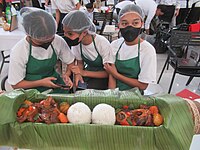Kaldereta
  Top: Goat kaldereta; Bottom: Beef kaldereta with rice | |
| Course | Main course |
|---|---|
| Place of origin | Philippines |
| Region or state | Popular in the Philippines, Luzon (Southern Tagalog) |
| Serving temperature | Hot |
| Main ingredients | Goat /mutton shoulders, corn oil, onion, garlic, carrots, bell pepper, potatoes, chili, flour, liver spread, tomato paste, butter, stock (beef or brown) |
| Variations | Beef, pork, chicken |
| Similar dishes | Afritada, Menudo |
Kaldereta or caldereta[1][2] is a goat meat[3] stew from the Philippines. Variations of the dish use beef,[4] chicken,[5] or pork. Commonly, the goat meat is stewed with vegetables and liver paste. Vegetables may include tomatoes, potatoes, olives, bell peppers, and hot peppers. Kaldereta sometimes includes tomato sauce. Kaldereta is usually served during special occasions such as parties and festivities.
Caldereta's name was derived from the Spanish word caldera, meaning cauldron. The dish is similar to meat stews from the Iberian Peninsula and was brought to the Philippines by the Spaniards during their 333-year occupation of the Philippines.
It also has similarities with afritada and mechado because it uses tomatoes, potatoes, carrots, and bell peppers as its main ingredients.
Gallery
[edit]-
Galdetang Dumara (duck)
-
Beef kaldereta
-
Kalderetang Bulalo
See also
[edit]References
[edit]- ^ Dagoon, Jesse D; Dagoon, Aida L; Dagoon, Jasmin Flora L (1999). Culinary Arts I. Manila: Rex Book Store, Inc. p. 138. ISBN 971-23-2603-9. Retrieved June 30, 2016.
- ^ Schwabe, Calvin W (1979). Unmentionable Cuisine. University of Virginia Press. p. 152. ISBN 0-8139-0811-6. Retrieved June 30, 2016.
- ^ "Kalderetang Kambing Recipe". Pinoy Recipe At Iba Pa. Retrieved September 22, 2011.
- ^ "Kalderetang Baka Recipe". Pinoy Recipe At Iba Pa. Retrieved December 16, 2007.
- ^ "Chicken Caldereta Recipe". Pinoy Recipe At Iba Pa. Retrieved September 22, 2011.
External links
[edit] Media related to Kaldereta at Wikimedia Commons
Media related to Kaldereta at Wikimedia Commons




